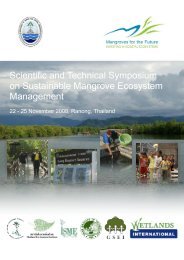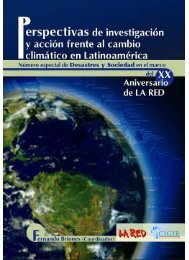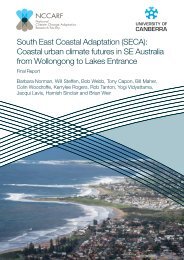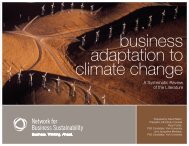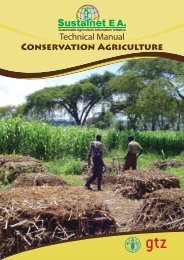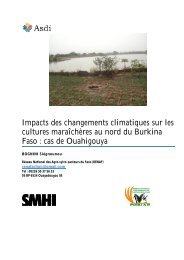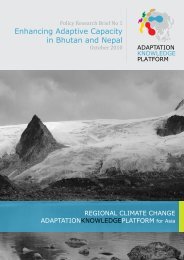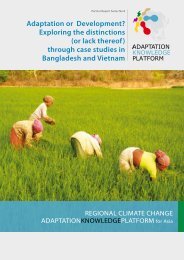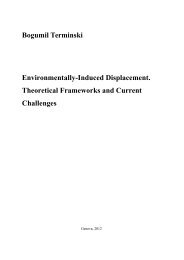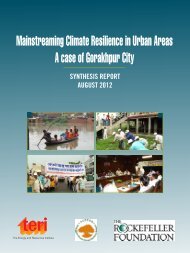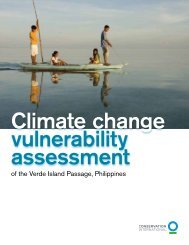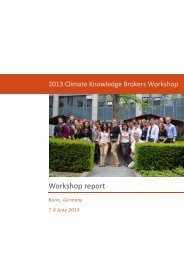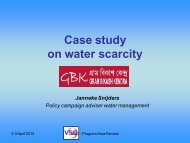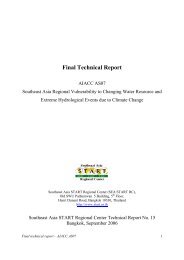The third key aspect is fairness – that we’re producing <strong>food</strong> in such a way that it’sviable for farmers to stay on the l<strong>and</strong>, <strong>and</strong> continue producing that <strong>food</strong>. Fairnessdoesn’t often come into the definition of <strong>food</strong> <strong>security</strong>, but if you want long-term<strong>food</strong> <strong>security</strong> <strong>and</strong> a resilient system, then you actually need to be paying peopleto stay on the l<strong>and</strong>. There’s so many farmers leaving the l<strong>and</strong> at the moment,that’s a real issue, <strong>and</strong> should be seen as a really core element of <strong>food</strong> <strong>security</strong>[Academic researcher].Academic researchers we spoke to were especially concerned about the issues ofenvironmental sustainability, <strong>climate</strong> <strong>and</strong> resource <strong>resilience</strong>, <strong>and</strong> fairness. Oneexperienced academic offered this multi-dimensional conceptualisation:Food <strong>security</strong> is about sufficient, equitably accessible <strong>and</strong> sustainable <strong>food</strong>.Sustainability in this context means <strong>food</strong> produced in such a way that doesn’tundermine the ability of future generations to meet their own <strong>food</strong> needs. That’sreally important, <strong>and</strong> isn’t talked about enough, especially in relation to water <strong>and</strong>l<strong>and</strong> issues, on the peri-<strong>urban</strong> fringe ...The third key aspect is fairness – that we’re producing <strong>food</strong> in such a way that it’sviable for farmers to stay on the l<strong>and</strong>, <strong>and</strong> continue producing that <strong>food</strong>. Andwe’re not currently doing that [Academic researcher].Similar comments about conventional definitions of <strong>food</strong> <strong>security</strong> were made by othersin the community sector that might be regarded as part of the broader ‘fair <strong>food</strong>movement’. One commented that ‘<strong>food</strong> <strong>security</strong> sounds very official, <strong>and</strong> a lot of peopledon’t relate to that’. Another said ‘<strong>food</strong> <strong>security</strong> can put some people off – peopleunderst<strong>and</strong> growing your own, being healthy, being sustainable, <strong>and</strong> that’s the sort oflanguage we use’.One of the backyard gardeners <strong>and</strong> community <strong>food</strong> activists with whom we spokehighlighted the concepts of control <strong>and</strong> self-sufficiency in her underst<strong>and</strong>ing of <strong>food</strong><strong>security</strong>:[Food <strong>security</strong>] means having control over my own <strong>food</strong>, knowing I’m going tohave continued access to it. Self-sufficiency is not quite my aim. I want to providefor as much of my own needs as I can, but I don’t think total self-sufficiency is arealistic objective. Our aim is not to have buy any fruit <strong>and</strong> vegetables during thesummer <strong>and</strong> autumn [Permaculturalist <strong>and</strong> backyard gardener].4.2.2 How is <strong>food</strong> <strong>security</strong> likely to be impacted by <strong>climate</strong> <strong>change</strong>?Amongst the small sample of commercial farmers <strong>and</strong> growers we spoke with, therewas generally a degree of scepticism about the empirical reality of anthropogenic<strong>climate</strong> <strong>change</strong>. This appears to be reflected also in the current Victorian <strong>and</strong>Queensl<strong>and</strong> administrations, with interviewees reporting a strong strain of <strong>climate</strong>scepticism <strong>and</strong> even denial amongst leading politicians. By contrast, <strong>urban</strong> agriculturalpractitioners <strong>and</strong> researchers with whom we spoke firmly believed that <strong>climate</strong> <strong>change</strong>would affect <strong>food</strong> production in Victoria, especially in the northern <strong>food</strong> bowl region ofthe Murray Darling Basin. We were not able to speak with as many similar practitionersin Queensl<strong>and</strong>.<strong>Urban</strong> <strong>food</strong> <strong>security</strong>, <strong>urban</strong> <strong>resilience</strong> <strong>and</strong> <strong>climate</strong> <strong>change</strong> 35
The research revealed that there is, as expected, a mixed reaction towards theexistence <strong>and</strong> the impacts of <strong>climate</strong> on <strong>food</strong> <strong>security</strong> (or <strong>food</strong> production) in Australia.Ranging from politicians, to commercial farmers to hobby gardeners, <strong>climate</strong> <strong>change</strong>scepticism <strong>and</strong> even denialism was evident. One of the most concerning revelationswas the perceived lack of concern about <strong>climate</strong> <strong>change</strong> among some politicians:In their [politicians] worldview, <strong>climate</strong> variability, resource constraints, l<strong>and</strong> useconflicts, none of that figures into their calculations. In general, they are <strong>climate</strong><strong>change</strong> deniers. Climate <strong>change</strong> is an economic problem … [<strong>and</strong>] now we’rebasically not talking about it at all, it’s fallen to the wayside...to the point that theyhave even cut the <strong>climate</strong> <strong>change</strong> unit in DPC … [but] this wave of denialism,<strong>and</strong> anti-science, is not unique in Victoria, it’s across Australia [State GovernmentEmployee].The recently elected Mayor of the Gold Coast, whilst not rejecting scientific evidenceabout <strong>climate</strong> <strong>change</strong>, has been reported recently as saying that it is simply too faraway in time for him to be concerned about sea level rise:I don't intend to use our ratepayers' funds for something that is going to happenin 90 years. It may or may not be wiped out ... I live on the water <strong>and</strong> what mayhappen to my house in 90 years is not my concern. (Gold Coast Bulletin, 27/9/12)Many commercial <strong>and</strong> hobby farmers expressed their disregard for <strong>climate</strong> <strong>change</strong>,often suggesting that this was a natural event. For example, an older dairy farmer fromthe Mornington Peninsula, who began farming in 1973, expressed his disdain towards<strong>climate</strong> <strong>change</strong>:The <strong>climate</strong>’s been changing for millennia. I don’t think there’s anything that’shappening now that’s out of the ordinary. We’ve had droughts before. We’ve hadrain before. We’ve had wet years before, <strong>and</strong> similar patterns to the last 10–15years … In geological terms, we’re pissing in the wind. Nobody wants to hearthat. It’s good going <strong>and</strong> planting trees <strong>and</strong> all that, but the environment, where Igrew up, is so different now to when I was a kid [Dairy Farmer, Melbourne].A major commercial horticulturalist from the same region, whose family had beengrowing for a number of generations, shared his scepticism <strong>and</strong> disdain towards thevery proposition that anthropogenic <strong>climate</strong> <strong>change</strong> existed as a phenomenon, albeit ina somewhat contradictory manner:Climate <strong>change</strong> is all bullshit, people just jumping on the b<strong>and</strong>wagon. Nature hasto take its course, we can’t stop it, we can’t control nature. There was ten years ofdrought in Clyde, but now the weather’s <strong>change</strong>d again. There are sometimesearly springs, <strong>and</strong> early summers. If that happens, we adapt, we do the best wecan. We sense the <strong>change</strong>s. The early springs <strong>and</strong> summers mean that it will behot <strong>and</strong> muggy <strong>and</strong> wet [Market Gardener, Melbourne].Furthermore, a small-scale market gardener from the Cardinia region in Victoriaexplains that even though the science of <strong>climate</strong> <strong>change</strong> have advanced <strong>and</strong> ‘proven’the phenomenon, he has not seen any difference to his farming:Nothing has really <strong>change</strong>d for us in the 30 odd years that we have beengardening, including the <strong>climate</strong>, it <strong>change</strong>s with the seasons. So perhaps the<strong>Urban</strong> <strong>food</strong> <strong>security</strong>, <strong>urban</strong> <strong>resilience</strong> <strong>and</strong> <strong>climate</strong> <strong>change</strong> 36
- Page 1 and 2: Synthesis and Integrative ResearchF
- Page 3 and 4: Published by the National Climate C
- Page 5 and 6: ABSTRACTFood security is increasing
- Page 7 and 8: 1. a review of the literature: on n
- Page 9 and 10: its Food for All project. This help
- Page 13 and 14: In response to the existential thre
- Page 15 and 16: 2. OBJECTIVES OF THE RESEARCHFood i
- Page 17 and 18: debates and to the more systematic
- Page 19 and 20: organisation in the past few years.
- Page 21 and 22: 4. RESULTSIn this section we presen
- Page 23 and 24: increasing productivity. Thus, whil
- Page 25 and 26: people and the origins of their foo
- Page 27 and 28: urban food supply chains. Thus, whi
- Page 29 and 30: This logistics system is dominated
- Page 31 and 32: Like Hodgson et al., as per definit
- Page 33 and 34: esilient, powerful by being locally
- Page 35 and 36: volume or even its contribution to
- Page 37: community food growing can have on
- Page 40 and 41: generations this history has been f
- Page 42 and 43: a stronger focus on addressing the
- Page 46 and 47: climate (which we live and work in
- Page 48 and 49: agriculture. Eight percent is in ur
- Page 50 and 51: This concept of the ‘spaces in be
- Page 52 and 53: esearch scientist and chair of the
- Page 54 and 55: As discussed above, protection of t
- Page 56: 4.2.5 What is the extent and the im
- Page 60 and 61: no place under the panoply of pract
- Page 62 and 63: increased, the market dominance of
- Page 64 and 65: … the residents of S Park called
- Page 66 and 67: 5. CONCLUSIONSThere is growing conc
- Page 68 and 69: urban resilience. This inevitably c
- Page 70 and 71: In many respects these contrasting
- Page 72 and 73: Many interviewees of both standpoin
- Page 74 and 75: a given area. The rationale for thi
- Page 76 and 77: mapping the location of sources of
- Page 78 and 79: Australian food policy debates refl
- Page 80 and 81: APPENDIX 1: URBAN FOOD SECURITY, UR
- Page 82 and 83: IntroductionGlobally, and in Austra
- Page 84 and 85: Review methodsThis stage of the res
- Page 86 and 87: despite many of the causes of food
- Page 88 and 89: …by 2050… food production will
- Page 90 and 91: 2. How is food security (in general
- Page 92 and 93: the food security of cities, but no
- Page 94 and 95:
While some see the density of devel
- Page 96 and 97:
when suppliers, distributors, and c
- Page 98 and 99:
a more prominent role in enhancing
- Page 100 and 101:
community gardens webpage on the Co
- Page 102 and 103:
comprehensive description of the ca
- Page 104 and 105:
In both the developed and developin
- Page 106 and 107:
Their review notes a significant in
- Page 108 and 109:
lines of supply from often rural pl
- Page 110 and 111:
1 IntroductionCities have always be
- Page 112 and 113:
Despite some attempts to curb urban
- Page 114 and 115:
the Gold Coast remains a city that
- Page 116 and 117:
ackyard/community gardenernot affil
- Page 118 and 119:
level in local government. VicHealt
- Page 120:
Figure 2: Impacts on Municipal Food
- Page 125 and 126:
security I recognise that the cost
- Page 127 and 128:
United States, he offered the follo
- Page 129 and 130:
This vision highlights the multi-fu
- Page 131 and 132:
An environmental education centre.
- Page 133 and 134:
Melbourne Food ForestA Melbourne ga
- Page 135 and 136:
stakeholder consultations, the repo
- Page 137 and 138:
can. We sense the changes. The earl
- Page 139 and 140:
half-desert environments. We’re g
- Page 141 and 142:
etain its basic function and struct
- Page 143 and 144:
government; and that trying to get
- Page 145 and 146:
the north and the west, where it wo
- Page 147 and 148:
Why do people buy so much food that
- Page 149 and 150:
urban agriculture (however broadly
- Page 151 and 152:
enefits and risks. Before we can co
- Page 153 and 154:
Another important and tangible role
- Page 155 and 156:
coast without any problems whatsoev
- Page 157 and 158:
BIBLIOGRAPHYAECOM (2011) Scoping St
- Page 159 and 160:
Burns, C. I., A. (2007). Measuring
- Page 161 and 162:
Edwards, F., & Mercer, D. (2010). M
- Page 163 and 164:
James, S. O’Neill, P. and Dimeski
- Page 165 and 166:
Millar, R., 2012, ‘Government shi
- Page 167 and 168:
Saltmarsh, N. M., J; Longhurst, N.
- Page 169 and 170:
Walker B., 2008, Resilience Thinkin



